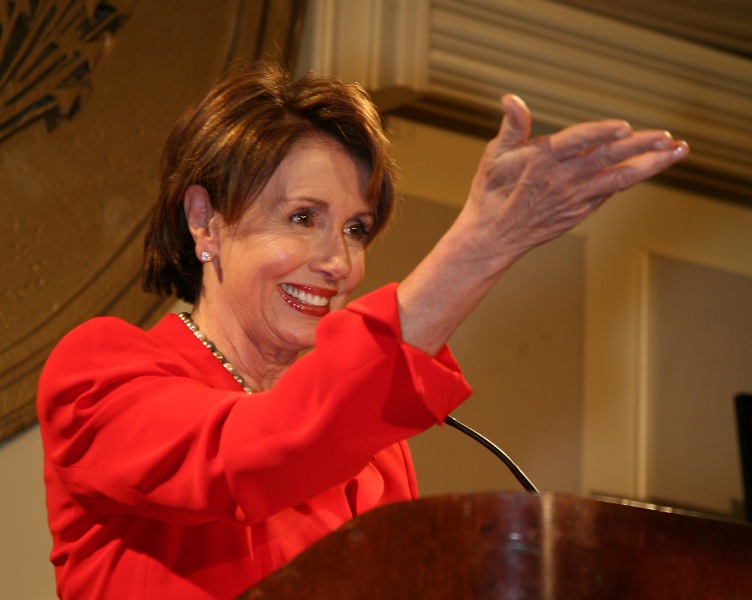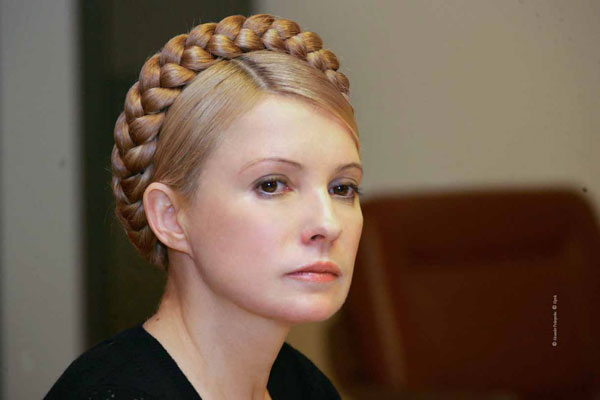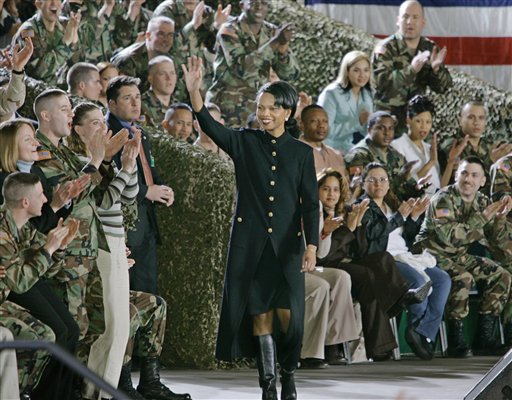Fashion is Political
Fashion Editor Robin Givhan Talks Politics

Take, for example, protesters during the Civil Rights era. They marched into an onslaught of vicious dogs and fire hoses dressed like they were going to church. They looked so dignified. And I believe that their appearance underscored their message of humanity and justice.
Consider the way in which politicians -- at least the male ones -- are forever taking off their suit jackets and rolling up their sleeves whenever they find themselves addressing blue-collar workers. The gesture is somehow meant to signify sincerity and straight-talk. Also, what are all of those flag pins on lapels but a fashion statement about patriotism? Some might see it as sincere; others might interpret it as hogwash. But there's no denying that fashion -- in this case a brooch -- is used as a political statement.
What can you tell about the political views of Hillary Clinton and Condoleezza Rice from the way they dress?
I don't know if particular styles indicate liberalism or conservatism. I don't think those on the left dress profoundly different from those on the right. Sure, there's the stereotype of left-leaning women as being crunchy-granola, Birkenstock-wearers, and those on the right dressing in prim yellow suits and pearls. Some of that exists, but most women fall in the muddled middle. I think what's most striking about Clinton and Rice is that both of them are in history-making positions of power as women and, for Rice, as an African-American. With each barrier that's broken, I think we come to a new understanding of what power can look like and sound like.
I've talked about Rice's appearance at Wiesbaden Army Airfield wearing a long black coat and knee-high black boots. The ensemble had a sexiness to it that we hadn't seen before in any of our leaders of that rank. I think we are still uncomfortable with women of authority who refuse to hide their sexuality behind a boxy suit and sensible heels.
For example, I was surprised by the amount of outrage that followed a column I wrote about Clinton showing cleavage on the Senate floor. I made it clear that it wasn't an unseemly amount, but just enough to be noticed. I thought it was a sign of confidence -- a merging of gender and power. Some people reacted as if I'd given her a catcall. As a culture, we still aren't comfortable noticing and acknowledging femininity in the halls of power. Women don't have to dress in navy suits and blouses with floppy bows. But we still have a long way to go.
How intertwined, then, are politics and fashion, appearance and authority?
I think the combination of politics and fashion is a natural one. Politicians are more concerned about the messages they convey, the way in which they're coming across to their constituency and the way in which they're perceived, than any other group of people I can think of, except perhaps, for entertainers.
Fashion has been used in politics as a way of showing solidarity and respect. When a politician graciously accepts a sweatshirt emblazoned with a school logo or pops on a cap with a union logo, it's a way of announcing: I am one of you. When heads of state visit foreign countries and dress in that country's traditional garb, it's a way of showing respect and mutual understanding. Our clothes identify us as members of a particular tribe in the same way our accent or our slang does. We tend to trust people who talk like us. We also tend to feel more at ease with those who dress like us.
Can you give us some contemporary examples of female politicians' fashion choices, and what those choices say about them?
I loved that Ellen Johnson-Sirleaf, on her 2006 visit to the United States, wore a traditional African attire with pearls. For me, she combined cultural authenticity and pride with a very Western flourish. It was a way of having one foot firmly in the needs and traditions of Liberia, along with recognition that sometimes reassurance for outsiders lies in the details.
Can you think of a female politician whose fashion style misfired and, proverbially, brought her down?
I don't think fashion has the power to bring down a female politician, unless she was wearing something profoundly outrageous or culturally offensive. Fashion is more like a detail or a flourish that can enhance or distract. The person who comes immediately to mind is Katherine Harris, who was the Secretary of State in Florida during the 2000 presidential election recount. Her excessive makeup distracted from her work. And in my mind, it even made one wonder about her broader ability to use restraint and moderation in the handling of the recount. When she later ran for Congress, she reduced the amount of makeup she was wearing -- and won. I tend to think most female politicians only rise to power because they have -- for the most part -- found a way to navigate the style issue.
Has the appearance -- hair, fashion, grooming, weight, clothes, accessories -- of a politician become the new best way to understand her true intentions?
I would never say that appearance telegraphs intentions. Fashion is a far too unreliable language. A short skirt can have a multitude of meanings depending on who's doing the looking. But that's also what makes it so fascinating. Fashion can make what a person is saying more or less believable.
Politicians have worked hard to master the art of dressing for their audiences. They no longer feel comfortable dressing in a way that outshines or intimidates the audience. No one wants to be caught wearing a $5,000 suit. We've become a country that likes to think of our politicians as "just like us." Politicians work hard to blend in and appear approachable and real. The trick is not to let anyone see how hard you're working to appear so natural. Remember poor Al Gore when he was a presidential candidate? The media found out that he'd been advised to wear earth tones and I think some pundits are laughing to this day. When people discover a politician is being "dressed", in their eyes that politician has been reduced to an infant.
Is appearance more important to women in power or men in power?
Women have a disadvantage in politics because they don't have a uniform to hide behind. They don't have the dark business suit, white shirt and red tie. But that also allows women to stand out. They have more leeway, more options for dressing casually, for instance. Men often look incredibly uncomfortable as soon as they're not wearing a suit.
I do think there are different standards. I don't necessarily think that it's unfair. Men and women are different and they bring different characteristics to their work. That's why we need both genders with equal places at the table.
What is the ideal "look" for a female politician?
I think essentially we want our female leaders to look noticeably attractive without drawing attention to themselves with their attire. That's a tricky balance. I think Hillary Clinton does it quite often. But I don't think you can say that a bright geranium-colored blazer is subtle. We don't want our female politicians to look masculine; we also don't want them looking too "girly."
Name one female politician, in the United States and abroad, whose appearance and political message are in sync.
I think Nancy Pelosi looks especially chic, smart and authoritative. I also thought Benazir Bhutto balanced contemporary sophistication with traditional modesty and seriousness.
Finally, hair and accessories: What kind of hair should female politicians have to be considered electable?
Yulia Tymoshenko, for example: I think her braids are, uh, a reflection of her intimate knowledge of what appeals to her constituency. I don't think they play on a world stage, however. I tend to believe that white female politicians in the United States are selecting their hairstyles based on what they believe to be age-appropriate rather than politically savvy. In this country, there is a belief that women of a certain age should not wear their hair long -- that it's too juvenile. In the United States, we do tend to equate long locks with youth and sexiness. Those are not necessarily two notions a woman wants to conjure up when she's, say, running for Senate.
I also think black women have more complicated hair issues. Some black female politicians at the Congressional and state level wear their hair in braids, for instance. And I think that style speaks to their constituency in a very intimate way. But, would we elect a candidate with dreadlocks to the presidency in the near future? I don't think so. The style is associated too much with rebellion and subversiveness. Voters tend to want a candidate whose appearance reassures them, not one whose style agitates them.



